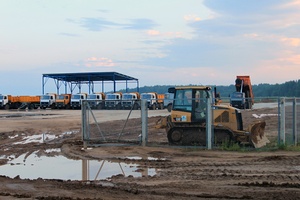
Arctic Frontiers: Disinformation, Security and the Northern Sea Route
Bellona held a seminar on countering Russian disinformation in the Arctic at the Arctic Frontiers international conference in Norway
News

Publish date: January 11, 2016
Written by: Andrei Ozharovsky, Charles Digges
News
Lithuania’s Foreign Minister Linas Linkevičius, has said his country will absolutely refuse to buy electric power produced by two large Russian nuclear power plants under construction near his nation.
The Baltic Nuclear Power Plant in the Russian enclave of Kaliningrad, neighboring Lithuania, and the Belarusian nuclear plant, being built by Russia in the border town of Ostovets, are largely viewed as environmentally unsound and economically unneeded.
Lithuanian Energy Minister Rokas Masiulis in late December issued a call to Poland, Estonia and Finland to similarly boycott energy produced by these two plants, and that they unite to buy energy from a third country that, as he said, doesn’t build dangerous nuclear power stations.
 A protest mounted by the Russian anti-nuclear group Ecodefense of the Baltic Nuclear Power Plant. (Photo: Ecodefense)
Photo: Фото: ecodefense.ru
A protest mounted by the Russian anti-nuclear group Ecodefense of the Baltic Nuclear Power Plant. (Photo: Ecodefense)
Photo: Фото: ecodefense.ru
“We need to issue a clear signal that electric energy produced in violation of international regulations of nuclear safety and intergovernmental environmental impact assessments won’t be accepted in the EU,” said Masiulis, in a December 23 letter to his foreign counterparts, according to the ru.delfi.lt news portal.
In particular, the Belarus plant has run afoul of the 1997 Espoo Convention on trans-border pollution.
Masiulis added that the countries must discuss their power issues on a local and European Union level.
“I fully support the idea that potential buyers of nuclear electricity put forward safety standards,” said Nils Bøhmer, Bellona’s executive director and nuclear physicist. “In addition to safety standards criteria, the potential buyer should also get guarantees that radioactive waste handling costs and [plant] decommissioning costs are included in the price.”
According to Masiulis, the Belarusian and Kaliningrad nuclear plants pose both environmental risks and create a monopoly type situation that close out other power producers to the Baltic region.
The Belarusian plant is located only 50 kilometers from Vilnius.
Bøhmer said that “Lithuania has an extra concern, since they would very likely to be affected by any accidents at either of the nuclear power plants.”
Alexander Nikitin, chairman of the Environmental Rights Center Bellona, however, dismissed the Lithuanian strategy in an email interview as “chit-chat.”
In his view, “ecology is not the first issue” in Lithuania’s strategy, and that whether the country followed through “depends on economic circumstances and political decisions.”
Bøhmer said that energy price issues were certainly a factor.
“Lithuania’s goal is to have a fair pricing of the different energy sources,” he said.
Andrei Zolotkov, an adviser on nuclear energy with Bellona based in Murmansk zeroed in on the environmental issues surrounding the Belarusian plant, and the political vacuum in which it’s being built.
He said that whether the Belarusian plant had been discussed or not – and discussions of it led to the arrest of several activists, one from Bellona – it will be built all the same. Zolotkov attributed that to the totalitarian government in Minsk headed up by Alexander Lukashenko for this state of affairs.
“What is [Lukashenko] going to do with all of that electricity?” said Zolotkov. “It will become a problem for Belarus and Russia – maybe they want to collect a dumping price on it, but with oil as cheap as it is, that would be complicated.?
Zolotkov suggested the Belarusian plant could run its eventual reactors at less than full potential, just as the Kola nuclear plant does because of an overabundance of electricity in the Murmansk area.
“For instance,” wrote Zolotkov, “the Kola nuclear plant has already for years run at 67 percent capacity, only running at full capacity during winter months.”
Zolotkov also thought concerns about dealing with energy produced by the Baltic power station were unfounded, as its construction has been halted after protests.
Andrei Ozharovsky wrote from Russian and Charles Digges wrote and edited from the US.

Bellona held a seminar on countering Russian disinformation in the Arctic at the Arctic Frontiers international conference in Norway

Our December Nuclear Digest, reported by Bellona’s Environmental Transparency Center, is out now. Here’s a quick taste of three nuclear issues arisin...

Bellona has launched the Oslofjord Kelp Park, a pilot kelp cultivation facility outside Slemmestad, about 30 kilometers southwest of Oslo, aimed at r...

Our November Nuclear Digest by Bellona’s Environmental Transparency Center is out now. Here’s a quick taste of just three nuclear issues arising in U...